 |
Ambiences and Tendencies
John Lennon, Prophet of the Devil
Plinio Corrêa de Oliveira
On December 12, 1980, four days after John Lennon was killed, Prof. Plinio gave a talk analyzing the meaning of his life. Since the Vatican recently “absolved” Lennon for having affirmed that the Beatles were “more popular” than Our Lord Jesus Christ and praised his music, it seems quite timely to revisit those comments of Prof. Plinio. This is why TIA is reproducing them here.
A topic that is exciting the media this week is the murder of musician John Lennon by a man who is being called mentally ill. Lennon is a person who has been praised and honored beyond any reasonable limit. I say this because one of the Brazilian newspapers posted a blasphemous ad comparing him to Our Lord Jesus Christ. It commented that after Lennon’s death, one should expect that no more Christs to expire by violence.
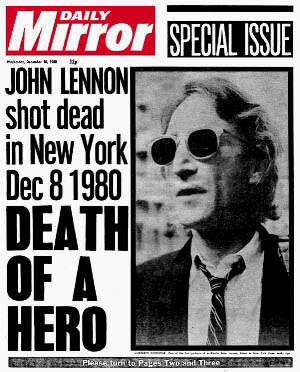
At his death, Lennon was presented as a hero |
I believe this is one blasphemy on top of another: First, because there is no series of Christs in History. The place of Our Lord has no parallel with any other man. Second, it leads one to think that the only merit of Christ’s death would be to have suffered violence. According to this view, there would be no sin to be redeemed, no error to be corrected, no unjust persecution of the good to be lamented, no innocent Victim who voluntarily offered Himself for us. The only thing that counts is that his life ended violently. Our Lord was infinitely more than just a victim of violence. But I don’t want to lose time with this. Let’s go ahead and analyze the life of this personage, John Lennon.
We find men who behaved badly in any period of History. What draws our attention in this case is not only Lennon’s corrupt morals and customs, but the way the public received him and his music. You know the principle, “Tell me with who your friends are, and I will tell you who you are.” We could paraphrase it, saying “Tell me who you praise, and I will tell you who you are.” If this man was praised by the media of an entire epoch, then this epoch can be defined by Lennon’s thinking. Thus, I will not study Lennon for what he was personally, but for what our epoch accepted him as being.
To assist me in this commentary, I requested a short biographical note. I will read it now.
Biographical note
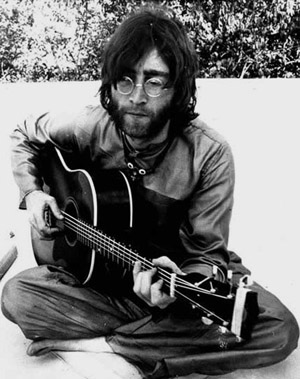
Lennon - the dirty, sloppy style of the hippy |
John Lennon was born in Liverpool, England in 1940. He was one of the four members of the rock band The Beatles whose albums sales broke records, selling hundreds of millions of copies. The Beatles deeply marked the 1960s, introducing a new way of being that helped to launch the Revolution of the Sorbonne (May 1968). In 1970 the band dissolved, to the distress of its fans. Each member then followed his own path.
Lennon made a fortune of over $240 million dollars. He bought a luxury five-story apartment in the Dakota building, one of the most fashionable residences in New York, and several country houses. During this period, he entered deeper into Eastern mysticism, making many trips to India. His external appearance changed to correspond to his new convictions.
He lived with a Japanese woman, Yoko Ono, and invited the press to photograph and film a sexual act of the couple at his apartment.
On the night of December 8, 1980, at around 11 p.m., he stepped out of a limousine in front of his apartment and a man on the street asked him: “Mr. Lennon?” He answered: “Yes.” The man, Mark David Chapman, fell to his knees, held his gun with both hands, aimed and shot five bullets at him. In the records of the police investigation, it was reported that the killer had heard an interior voice of the Devil telling him to end Lennon’s life. The voice said: “Kill Lennon, he is mine and I want him.”
Comments of Prof. Plinio:
I am not going to analyze the music of The Beatles to judge its artistic value, but rather I will consider from a Catholic perspective the influence this music had on the public and the kind of thinking it generated. This is an interesting exercise to make from the Revolution vs. Counter-Revolution (R-CR) perspective, for this music fundamentally produces a temperamental state that in itself exercises an influence over a person, independent of the lyrics. It demonstrates how the Revolution in the tendencies produces the Revolution in the ideas.
The advantage the Revolution takes of music
The great revolutions always had their counterparts in music. Music plays a special role in helping a revolution to be made or a war to be won. Music with great élan played or sung by troops in battle move the soldiers to go forward and win much more than a syllogism of an instructor ever could.
Imagine a professor going into battle with the soldiers carrying a loud-speaker and saying: “Soldiers: To serve your country is a duty; and to die for your country is a glory. Therefore, fulfill your duty, achieve glory and die!” Not many soldiers would be convinced by such a syllogism. Instead, grand music filling the whole battlefield with its reverberating notes - louder than the artillery fire and machine guns - will help to generate the sense of heroism necessary to win the battle. Such music is an instrument of war.
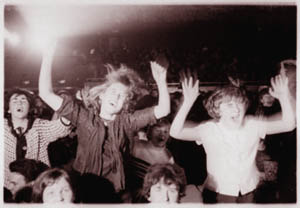
The Beatles unleashed a contagious hysteria, above, and decisively influenced the modern generation, below
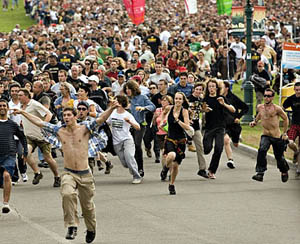
|
An analogous thing happens with the revolutions. I think that the most characteristic revolutionary music is La Marseillaise. It was the song the revolutionary mobs sang as they marched to the Tuilerie in Paris to destroy the monarchy. The music has an extraordinary grasp and something of a satanic fire. It exalts, drags, intoxicates, and creates illusions in those who hear it - and thus helped the Revolution reach its goals.
In this sense, the music of The Beatles also helped the Revolution achieve its goals. What were the weapons of this war? They were the hundreds of millions of records sold around the world, which spread the tendencies toward revolution against good customs and authority. The rock music disseminated in the ‘60s was a strong force in promoting the Cultural Revolution. Having started in Berkeley a decade before, the symbolic explosion of this Revolution actually took place in Paris at the Sorbonne University in May of 1968. What tendencies did this music spread?
Despite the luxury in which he lived, John Lennon appeared in the media and the minds of the common people as a man dressed in tattered clothing, a sloppy, dirty man who took the microphone to sing songs that produce a drugged effect on its victims. It leads them along the road of obscenity and filthiness. Lennon and his companions were like garbage trucks which, instead of collecting peoples’ trash from the streets, would spread garbage wherever they went.
Society always has morally degenerate people, but generally they are the exception to the rule, rejected and derided. Lennon and his companions transformed this type of degenerate person into a normal, accepted pattern of society. This is what this tendential revolution did.
Eastern mysticism aims to destroy the individual
The Hindu mysticism to which Lennon adhered is a variant of Brahmanism. I will not enter into details on it here. Generally speaking, its thinking is similar to that of Gnosis, which affirms that the great catastrophe was the emergence of the individual. Here in this room there are around 400 persons. Each one of us feels the pleasure of being himself, the joy of feeling the unfolding of his own personality. He is able to say: “I am not this or that person next to me. I am myself.”
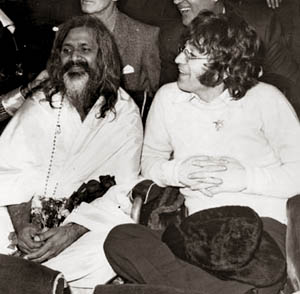
Lennon started in Eastern mysticism as a disciple of guru Maharishi Mahesh |
For Hindu mysticism, things are not like this. It considers it a great disaster that individual personalities came into existence. For it, the ideal is for all individuals to disappear and reintegrate into nothingness. They should enter this vacuum and become nothing. This is the Hindu path to light and bliss. It is not the Catholic Heaven where man retains his individuality for all eternity, adoring a God who is the model ideal of his personality and, therefore, will continuously help to increase and perfect it. The Hindu imagines that man enters into nothingness.
A metaphor may help you understand this philosophy. Imagine a powerful acid that dissolves any paper. Now, imagine a great writer, thinker or poet who commits his thoughts or poetry to paper. He dies, leaving all his work on paper. A careless heir accidentally lets those papers fall into a large container of the strong acid. All his work - whose richness came from its originality - is destroyed in the acid and comes to nothing. Any civilized man considers this a distressing episode because an original intellectual or artistic work was lost. The Hindu, however, considers such disaster to be the ideal.
Each of us is like a thought or a poem made by God. Hindu mysticism wants to destroy those likenesses of God and make the personalities of all men disappear by immersing themselves into an impersonal reality that it considers a divinity.
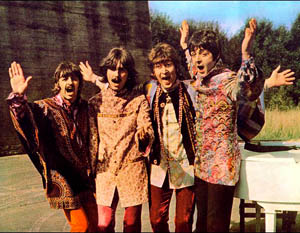
The Magical Mystery Tour was made during the Beatles' 'psychedelic' period |
Thus, this Lennon who achieved almost everything a young man from Liverpool could desire - an enormous fortune, an extraordinary celebrity, a life entirely dedicated to pleasure – decides to immerse himself in Eastern mysticism, whose finality is to destroy life. Lennon opted to reject all the material pleasures that no longer satisfied him. What a frustrated life! How absurd it is to compare this man to Our Lord Jesus Christ who is the Resurrection and the Life! Who by His own power resurrected from death on the third day and came to reign over the living and the dead for all eternity. Lennon’s life is the very opposite.
Parallel to this, Lennon and the Beatles experimented with drugs. Now then, the man who takes drugs is trying to flee from this life and enter an unreal life of illusions. Lennon was not satisfied with his $240 million and being an international celebrity, but felt the need to delve into the world of drugs. In other words, his life no longer meant anything to him. He said that he took LSD more than 1,000 times. In reality, he was a man who had already surrendered his life. When the murderer killed him, he killed a dead man, so to speak. Indeed, when a man is doing all he can to destroy himself, in a certain way he has already died.
This is a good example of the lie of human grandeur.
A demonic immorality
This man invited the press to photograph and film a conjugal act. This is entirely coherent with the hippy mentality and the Cultural Revolution. What should be intimate, given its prosaic, sordid, and indecorous note, was practiced in the open. Everything that was naturally private for the previous generations, the Beatles made public.
This confirms our metaphor of Lennon dispersing garbage, of distributing filth and ugliness. Here, I believe, he touched evil itself. This act publicly exposed all its hideous aspect in order to accustom the moral sense of the public to extreme impurity.
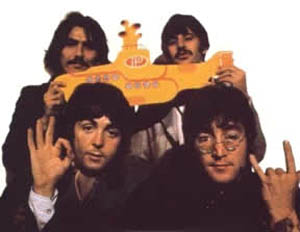
Lennon making the sign of Satan in a pose for the press |
The Devil rejoices in this type of exhibition of impurity. Imagine if the Devil were given the liberty to bring whatever he wanted into a magnificent building like the Vatican or the Austrian palace of Schonbrunn. Do you think that he would introduce some new splendid piece of furniture? Or an exquisite flower or magnificent painting? No. The Devil is the enemy of God and the enemy of the natural order created by God. When he is given liberty, he disrupts the order. This is what he likes to do. As much as possible he spreads the horrendous, dirty and ugly. If he could, he would fill the salons of the Vatican or the Schonbrunn with garbage. He would tear them up, burning and destroying all that he could. When exorcists oblige the Devil to leave a mark of himself to prove that he was in the soul of a person, he normally breaks, shreds and burns something in the room as he is expelled from a soul. This is consistent with his spirit.
If the Devil were to conceive a revolution for our days, it would be exactly like the Beatles’ revolution. This public sin, in my opinion, is an expression of the Devil himself. It is as if the Devil were telling the world: “This is the impurity proper to me. I am acting through my disciple Lennon, as I sing through his voice. Now, come and adore me.”
Preparing the public for the Devil
I believe that when men like Lennon and his fellow Beatles have conquered the public opinion of our century, then we are not far from seeing the day when all the institutions will be transformed in accordance with the ideals of the Cultural Revolution. Therefore, one can somehow say that the kingdom of the Devil exists on earth to the measure that the Beatle’s music becomes accepted by the general public.
Someone could object, “But the French Revolution also had some horrible aspects of impurity, ugliness and dirtiness. Why do you interpret them so tragically when they appear in the Beatles’ revolution?
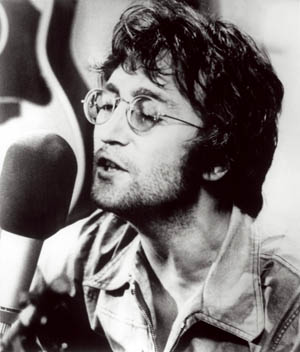
Lennon: "The whole Beatle idea is to do what you want..." |
The other revolutions had these aspects in a transitory way in some episodes. Generally speaking, they tried to veil those horrendous aspects, and instead to present beautiful things in order to attract the public. The Beatles’ revolution is different. That dirt, ugliness and filth constitute the very message the Beatles want to spread. It is a very different step.
So, that scandalous and public act of impurity that Lennon performed is like a trumpet announcing the Devil's arrival.
I don’t have any document proving that this was Lennon’s intention. However, any Satanist, any person who worships the Devil would be quite capable of doing what he did. The two actions fit perfectly.
So, we understand that what the media and, to great measure, the world is mourning today is a man who was a musical prophet of the Devil.
The way Lennon was killed also gives the impression that he was marked by the Devil to die. We can wait and see what the police investigation will conclude in this regard, but the first impression it gives is that he knew that his time limit was up. It seems that his death had already been fixed by the leaders of some diabolic sect.
It reminds me of those pacts that some persons make with the Devil. Some trustworthy stories tell us about how the Devil appears to this or that person and proposes: “I will give you 20 or 40 years of complete success on this earth, and then I will come to take you and bring you to Hell.” When the agreed-upon hour arrives, the Devil comes to demand his part of the bargain.
When we read the report of how Lennon was killed, we see that he didn’t have any natural reaction of trying to escape the murderer. Why didn’t he try to avoid being shot? He could have run; he could have kicked the man keeling at his feet; he could have called out for help. He did nothing, just passively awaited the shots as if it were something he was expecting.
The statement of the murderer – who affirmed that he heard the voice of the Devil claiming that Lennon’s soul belonged to him – concurs with this.
A Revolution leading to anarchy
This revolution is what I called the Fourth Revolution in my book Revolution and Counter-Revolution. It heads toward anarchy. This is actually affirmed in one of the slogans of the Sorbonne Revolution: “It is forbid to forbid.” No one can stop a person from revolting against nature or any authority. For instance, the authority says: “You should not steal.” The revolution says that since this command comes from an authority, it should not be obeyed. Each one should be able to do whatever he wants, even if it is to steal.
In Greek an means ‘without’ and archia means ‘authority’; so, anarchia or anarchy means without authority. No one is superior to anyone else. Each one does whatever he wants. There is no rule, no logic and no law. Man is reduced to the state of an animal that follows his own instincts. This is the Beatles' revolution.
These are the tendencies and ideas that come to my mind regarding the episode of the killing of John Lennon. They confirm for us how far the Revolution has advanced, how close we are to the kingdom of the Devil, and how timely our fight for the Counter-Revolution is. This fight – under the protection of Our Lady – will bring the triumph of her Immaculate Heart.
This lecture by Prof. Plinio Corrêa de Oliveira was taken from
the transcript of the tape, translated and adapted by Atila S. Guimarães
Posted January 12, 2009

|

Related Topics of Interest
 The Vatican Approves John Lennon The Vatican Approves John Lennon
 The Debasement of Knighthood The Debasement of Knighthood
 Why Are These Teens Screaming? Why Are These Teens Screaming?
 The Elvis Priest The Elvis Priest
 Catholic Church Promotes the Musical Erotica Catholic Church Promotes the Musical Erotica
 R-CR in the Tendencies, Ideas and Facts R-CR in the Tendencies, Ideas and Facts

Related Works of Interest
|
|
Ambiences | Cultural | Home | Books | CDs | Search | Contact Us | Donate

© 2002- Tradition in Action, Inc. All Rights Reserved
|
 |

|